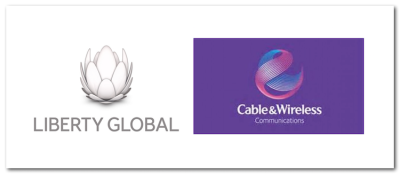 In early November 2015 the Caribbean telecom landscape changed dramatically never to return to any seemingly humdrum flow of bits across undersea fiber like soft shallow waves lapping on the sandy shores. One simple announcement flittered across the news channels with little regional fanfare: “Liberty Global buys CWC“.
In early November 2015 the Caribbean telecom landscape changed dramatically never to return to any seemingly humdrum flow of bits across undersea fiber like soft shallow waves lapping on the sandy shores. One simple announcement flittered across the news channels with little regional fanfare: “Liberty Global buys CWC“.
At a glance this non-descript headline seems innocent. You would not be faulted for skipping over it and turning to the funny pages. However, if you dove into the first couple paragraphs it would begin to dawn on you that an era of the UK-dominated Caribbean communications infrastructure had come to a swift end and that we are now entering fresh territory with a US global conglomerate taking firm control of the majority of the region’s communications infrastructure.
It isn’t the first time that the relatively calm telecoms Caribbean waters witnessed a big splash. Just one year before, almost to the date, the very CWC had acquired Columbus International, commonly known in the region as Flow to all its cable and retail Internet access customers.
At the time of that announcement Digicel had cried foul, but would have been better served to cry fowl and arrange some accompanying seasoning and sauce, for all the attention paid to their protests by regulators and consumers. I personally haven’t heard a great deal from them after this current deal.
This is possibly because they are deep in a significant fiber roll out and/or on a feverish hunt for relevant content to grab the interests of consumers for example their recent purchase of Jamaica’s Paymaster.
Or maybe they are examining the behemoth that is now their regional neighbour and competitor and thinking that the proverbial writing may well be on the wall. Time alone will tell. However we can look back through time to gather some insights into the present mix of cables before us.
In this article, I’ll take a quick look at the C&W Flow merger that led to the birthing of a new entity and laid the groundwork for this present deal. In a second piece, we’ll examine what these developments could mean for the region.
Back in 2014, eons ago, the then CWC CEO Phil Bentley announced that CWC was buying Columbus Int’l for approximately US$3 billion.
The Jamaica Gleaner on Nov 7th 2014 in capturing Digicel’s opposition to the deal reported,
“The parties have a conditional agreement on the cash and shares transaction for 100 per cent of Columbus’ equity, but Digicel is already signalling that it will be seeking the intervention of regulators, saying the deal raises issues about competition.
Under the agreement between the parties, CWC will pay cash of US$707.5 million and issue 1,557,529,605 new ordinary shares in CWC to three Columbus shareholders, giving them 36 per cent ownership in Cable & Wireless. The cash and share issue are valued at US$1.85 billion. Columbus’ debt of about US$1.2 billion will also be assumed by CWC.”
That to me seemed like a sweet deal with the resulting percentage ownership of CWC not being a bad thing at all. And if you were wondering who the three shareholders of Columbus were, the Gleaner went onto say,
“The new CWC shares – totalling 9.99 per cent of the British telecoms’ outstanding share capital – will be issued to investment vehicles controlled by director and co-founder of Columbus, John Risley, shareholder John Malone, and president, chief executive officer and co-founder of Columbus, Brendan Paddick.”
It was so innocently stated, investment vehicles controlled by the three men named, that one could miss the second name who is no stranger to big deals and whose company is a giant in the cable industry. It struck me at the time as curious that the deal focused more on shares than on cash, for one very significant reason.
As the Gleaner reported a week later on Nov 14th 2014,
“Jamaican-Canadian investor Michael Lee-Chin, whose firm Portland Private Equity (PPE) co-founded Columbus International Inc with the Risley group around 2005… PPE is now a minority shareholder in Columbus with a reduced 13 per cent stake. It started with almost 50 per cent shareholding and, over time, has invested US$65 million of its own funds in the telecoms. Its 13 per cent share of the US$1.85 billion offer would, by Financial Gleaner estimates, work out to US$240 million.
Three shareholders, Brandon Paddick, John Risley and John Malone, will take a 36 per cent stake in CWC under the deal, but Lee-Chin’s payout is expected to be in cash only. Lee-Chin said he would completely exit his investment in Columbus when the transaction closes.”
At the time of these developments, I was not yet writing this blog post and you weren’t involved in the conversations with my friends. So I won’t try to convince you that we believed that there was a bigger play at hand but needless to say the divergence in agreed compensation, cash vs shares in the resulting entity at that critical juncture was an indication that the game was about to change. The stage was clearly set for a lot of developments.
In the second part of this piece, I’ll examine the results of the decisions made at this point and implications for the region going forward.
Andre has over 15 years of experience in the Caribbean technology industry, contributing to a mix of private sector and non-profit projects deploying ICT solutions leveraging networking and hosted infrastructure management. He is the Business Development Manager for Mobile Products at Teleios Systems and a member of the coordinating team for the Caribbean Network Operators Group. Follow on Twitter: @AndreMEdwards.

 eCommerce4 months ago
eCommerce4 months ago